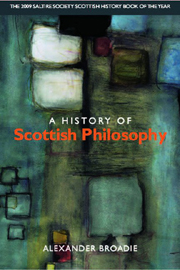Book contents
- Frontmatter
- Contents
- Acknowledgements
- 1 Introduction
- 2 John Duns Scotus
- 3 The Fifteenth Century
- 4 The Circle of John Mair
- 5 Humanism and After
- 6 Scotland Moves into the Age of Enlightenment
- 7 David Hume
- 8 Adam Smith
- 9 The Scottish School of Common Sense Philosophy
- 10 The Nineteenth Century: Ferrier to Seth
- 11 Realism and Idealism: Some Twentieth-century Narratives
- 12 Conclusion
- Bibliography
- Index
6 - Scotland Moves into the Age of Enlightenment
Published online by Cambridge University Press: 12 September 2012
- Frontmatter
- Contents
- Acknowledgements
- 1 Introduction
- 2 John Duns Scotus
- 3 The Fifteenth Century
- 4 The Circle of John Mair
- 5 Humanism and After
- 6 Scotland Moves into the Age of Enlightenment
- 7 David Hume
- 8 Adam Smith
- 9 The Scottish School of Common Sense Philosophy
- 10 The Nineteenth Century: Ferrier to Seth
- 11 Realism and Idealism: Some Twentieth-century Narratives
- 12 Conclusion
- Bibliography
- Index
Summary
Section 1: Three philosophers
Among the philosophers of the earliest years of the Scottish Enlightenment there are three in particular whom I shall consider in this chapter. Listed in order of publication of their first significant works they are Gershom Carmichael (1672–1729), George Turnbull (1698–1748) and Francis Hutcheson (1694–1746). Hutcheson is sometimes referred to as ‘the father of the Scottish Enlightenment’. That he was a major influence on the direction of the Enlightenment in Scotland is not in doubt but it has to be acknowledged that several other thinkers, including Carmichael and Turnbull, were also influential and have strong Enlightenment credentials. If it is thought necessary to invoke parentage on this matter it would therefore be preferable to regard these three thinkers as among the founding fathers of Scottish Enlightenment philosophy.
Section 2: Gershom Carmichael
Carmichael, the son of a Scottish Presbyterian minister, was a student at Edinburgh University (1687–91) and then taught briefly at St Andrews. Thereafter till his death in 1729 he taught at Glasgow, first as a regent in arts and then as professor of moral philosophy. Carmichael was perhaps the chief conduit to Scotland of the European natural law tradition, a tradition of scientific investigation of human nature with a view to constructing an account of the principles that are morally binding on us. The greatest contributors to the natural law tradition in the seventeenth century were Hugo Grotius (1583–1645), Samuel Pufendorf (1632–94) and John Locke (1632–1704).
- Type
- Chapter
- Information
- A History of Scottish Philosophy , pp. 104 - 146Publisher: Edinburgh University PressPrint publication year: 2008



